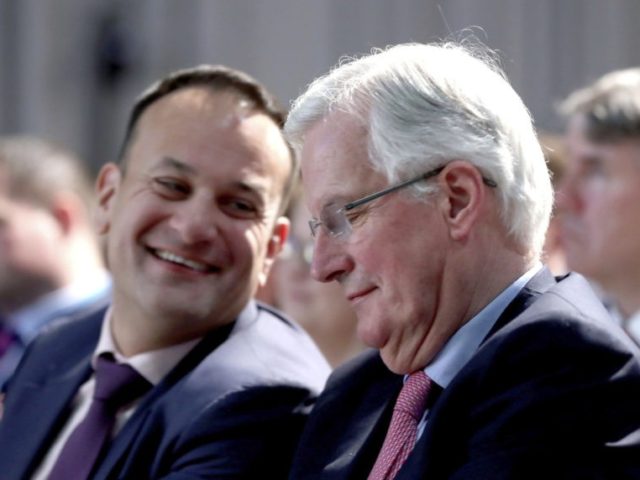BRUSSELS (AP) – The European Union’s chief Brexit negotiator said Friday that there are still “huge and serious divergences” between Britain and the bloc on Brexit, after U.K. Prime Minister Theresa May warned that failure to strike a good divorce deal could endanger European security.
Leaders of the 27 EU nations other than Britain were assessing the state of the faltering negotiations at a summit in Brussels on Friday. What was initially billed as a “Brexit breakfast” was delayed to a Brexit brunch, after all-night talks to ease a political crisis over migration.
EU Brexit negotiator Michel Barnier said “we have made progress” in divorce talks with Britain, “but huge and serious divergences remain, in particular on Ireland and Northern Ireland.”
Britain has promised to maintain an invisible border, free of customs posts and other infrastructure, between Northern Ireland and the Republic of Ireland – the U.K.’s only land frontier with an EU member. EU officials are impatient to hear detailed proposals from Britain for how that can be achieved, given May’s insistence that Britain will leave the EU’s customs union.
Barnier said he wanted British negotiators to return to Brussels on Monday for renewed talks. May said Britain was ready to “intensify and accelerate the pace of negotiations” after complaints from the bloc that divisions in her government are blocking progress.
May’s Conservative administration is divided about how close a relationship to seek with the EU after Brexit. The British leader is caught between pro-EU parliamentarians who want to retain close economic ties with Britain’s biggest trading partner, and pro-Brexit lawmakers who want a clean break so Britain can strike new trade deals around the world.
British divisions look set to come to a head July 6, when May gathers her fractious Cabinet at Chequers, the prime minister’s country retreat, to try to draw up a united plan for future trade and security ties with the EU.
Barnier said he was awaiting the position paper the U.K. government plans to produce after the Cabinet meeting.
“I hope it will contain workable and realistic proposals,” he said. “The time is very short. We want a deal and we are working for a deal.”
Britain, meanwhile, is frustrated by what it sees as the bloc’s inflexible approach in negotiations.
EU leaders have warned, repeatedly, that Britain can’t cherry-pick benefits of membership, such as access to the single market of 500 million consumers, without accepting the responsibilities that come with being in the bloc, including allowing free movement of EU citizens to the U.K.
Britain hopes to get tailor-made arrangements, both on trade and on security.
At Thursday’s summit dinner, May warned her EU colleagues against shutting Britain out of key law-enforcement bodies after Brexit.
She said the U.K. currently has “a high level of cooperation with member states of the EU in a number of areas on security that are important for our citizens. This is what’s at stake.”
The stalemate in talks has heightened fears in London and other European capitals of a “no-deal” Brexit, in which the U.K. crashes out of the bloc with no new framework for relations. EU officials worry that the timetable the two sides have set themselves – to reach a divorce agreement by October so that EU national parliaments can ratify it before Britain leaves the bloc in March – is slipping out of reach.
Lithuanian President Dalia Grybauskaite said all involved should work hard to avoid a no-deal scenario.
“It is in nobody’s interests at all to have a hard landing,” she said.

COMMENTS
Please let us know if you're having issues with commenting.